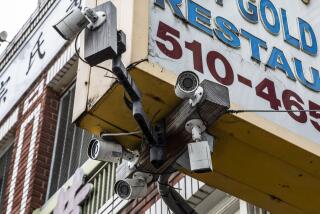Editorial: License-plate tracking by DEA trades away too much liberty
The military calls it “mission creep” — sending troops out for one purpose, then adding to their marching orders over time. This kind of metastasis is innocuous in some contexts, but not so benign when the government is collecting information about innocent people going about their daily lives. A perfect illustration is the Drug Enforcement Administration’s expansive license-plate tracking program that privacy advocates brought to light this week. What began as an effort to confiscate guns and cash from drug traffickers heading to Mexico has reportedly expanded into a general purpose surveillance tool for law enforcement agencies that treats millions of ordinary Americans as potential suspects.
Much of what we know about license-plate tracking comes from Freedom of Information Act requests filed by the American Civil Liberties Union, which has tried to raise awareness about the tracking systems operated by numerous local governments and private companies. Sophisticated cameras mounted along roadways or in parked cars record the plate number of every passing vehicle, then transmit the data to a central office for storage. The DEA began tracking plates in the Southwestern U.S. more than six years ago, then expanded the effort across the country in collaboration with local police. According to the Wall Street Journal, use of the data has expanded as well to support criminal investigations.
Defenders of plate-tracking argue that it’s not technically an invasion of privacy for the government (or anyone else) to keep an eye peeled on the public streets. And yet the same argument could be used to justify local police filming residents whenever they pull out of their driveways, analyzing and retaining a record of every trip they make. After all, if you’re not doing anything wrong, you don’t have anything to worry about, right? Except possibly being asked to explain why you attended a perfectly legal gun show, which the DEA once contemplated using plate-readers to surveil. There doesn’t appear to be any limit on how the data may be used, and in the case of private companies’ plate-tracking, few if any limits on how the long the information can be retained.
Law enforcement agencies say the plate-tracking systems have been valuable in generating leads and helping to capture suspects. They’re backed by banks, insurers and other companies that use private companies’ tracking systems to find deadbeat borrowers, among other pursuits. But by secretly collecting a vast amount of data without disclosing why or limiting its potential use, and by allowing the creation of tracking logs that are kept for years, the government is trading away too much liberty in the name of security.
Follow the Opinion section on Twitter @latimesopinion
More to Read
A cure for the common opinion
Get thought-provoking perspectives with our weekly newsletter.
You may occasionally receive promotional content from the Los Angeles Times.






